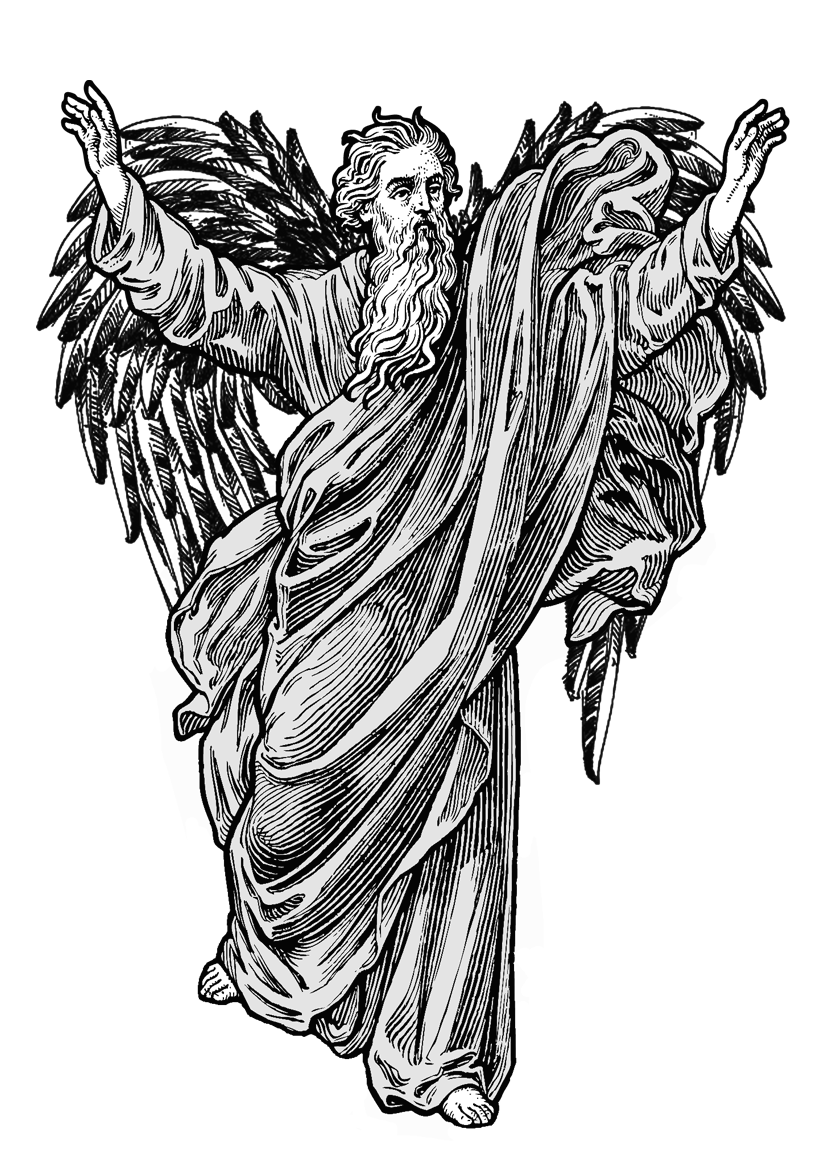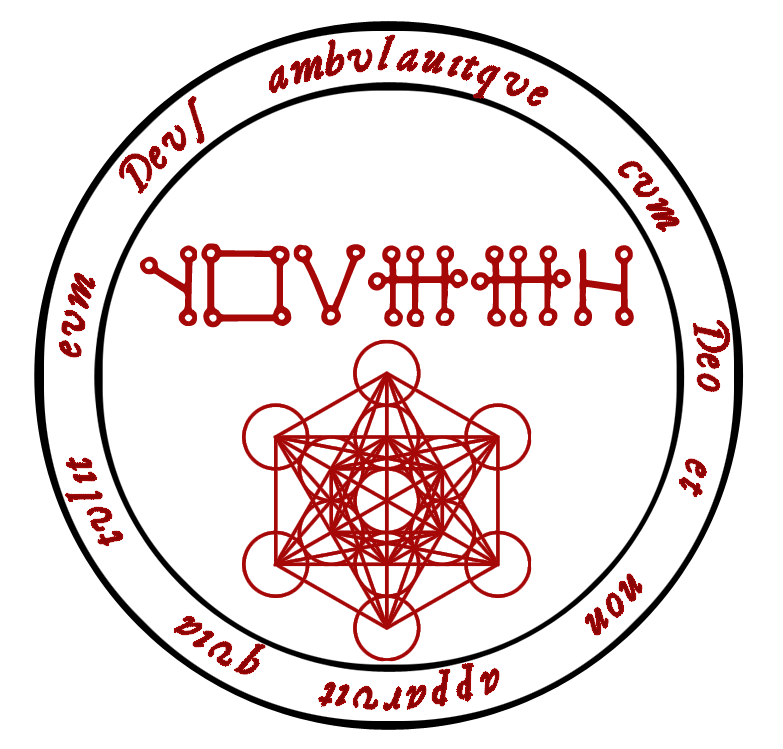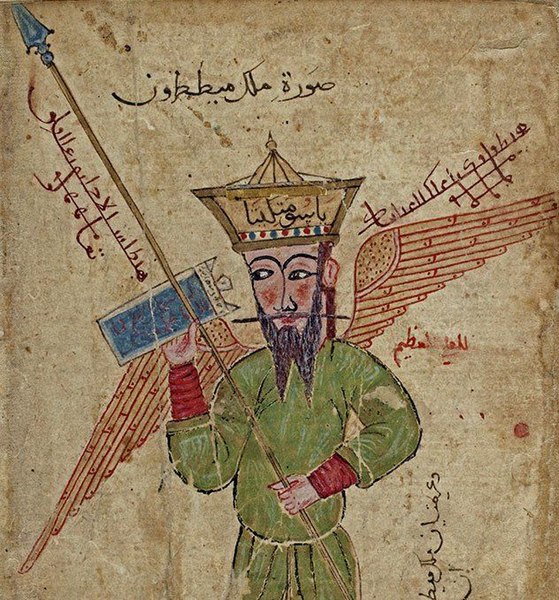Difference between revisions of "Metatron"
Occultwiki (talk | contribs) |
Occultwiki (talk | contribs) |
||
| (3 intermediate revisions by the same user not shown) | |||
| Line 1: | Line 1: | ||
[[File:Metatron.png|300px|thumb|Archangel Metatron as depicted in the [[Angel Tarot]]]] | [[File:Metatron.png|300px|thumb|Archangel Metatron as depicted in the [[Angel Tarot]]]] | ||
'''Metatron''' (Biblical Hebrew: מֶטָטְרוֹן) is an [[angel]] in [[Judaism]], [[Christianity]], and [[Islam]] mentioned three times in the Talmud, in a few brief passages in the Aggadah, and in mystical [[Kabbalah|Kabbalistic]] texts within Rabbinic literature. The figure forms one of the traces for the presence of dualist proclivities in the otherwise monotheistic visions of both the Tanakh and later Christian doctrine. In the Jewish kabbalistic tradition, he is sometimes portrayed as serving as the celestial scribe. The name Metatron is not mentioned in the Torah or the [[Bible]] and how the name originated is a matter of debate. In Islamic tradition, he is also known as ''Mīṭaṭrūn'' (Arabic: ميططرون), the angel of the veil. | '''Metatron''' (Biblical Hebrew: מֶטָטְרוֹן) is an [[angel]] in [[Judaism]], [[Christianity]], and [[Islam]] mentioned three times in the Talmud, in a few brief passages in the Aggadah, and in mystical [[Kabbalah|Kabbalistic]] texts within Rabbinic literature. | ||
The figure forms one of the traces for the presence of dualist proclivities in the otherwise monotheistic visions of both the Tanakh and later Christian doctrine. In the Jewish kabbalistic tradition, he is sometimes portrayed as serving as the celestial scribe. The name Metatron is not mentioned in the Torah or the [[Bible]] and how the name originated is a matter of debate. In Islamic tradition, he is also known as ''Mīṭaṭrūn'' (Arabic: ميططرون), the angel of the veil. | |||
In Jewish apocrypha and early Kabbalah, 'Metatron' is the name that Enoch received after his transformation into an angel. | In Jewish apocrypha and early Kabbalah, 'Metatron' is the name that Enoch received after his transformation into an angel. | ||
| Line 7: | Line 9: | ||
Numerous etymologies have been proposed to account for the name Metatron, but there is no consensus, and its precise origin is unknown. Some scholars, such as Philip Alexander, believe that if the name Metatron originated in Hekhalot-Merkabah texts (such as [[Book of Enoch|3 Enoch]]), then it may have been a magic word like Adiriron or Dapdapiron. | Numerous etymologies have been proposed to account for the name Metatron, but there is no consensus, and its precise origin is unknown. Some scholars, such as Philip Alexander, believe that if the name Metatron originated in Hekhalot-Merkabah texts (such as [[Book of Enoch|3 Enoch]]), then it may have been a magic word like Adiriron or Dapdapiron. | ||
Hugo Odeberg, Adolf Jellinek and Marcus Jastrow suggest the name may have originated from either ''mattara'' (מטרא, lit. 'keeper of the watch') or the verb ''memater'' (ממטר, 'to guard' or 'to protect'). An early derivation of this can be seen in ''Shimmusha Rabbah'', where Enoch is clothed in light and is the guardian of the souls ascending to heaven. Odeberg also suggested that the name Metatron might have been adopted from the Old Persian name ''Mithra''. Citing Wiesner, he drew up a number of parallels that appeared to link Mithra and Metatron based on their positions in heaven and duties. | Hugo Odeberg, Adolf Jellinek and Marcus Jastrow suggest the name may have originated from either ''mattara'' (מטרא, lit. 'keeper of the watch') or the verb ''memater'' (ממטר, 'to guard' or 'to protect'). An early derivation of this can be seen in ''Shimmusha Rabbah'', where Enoch is clothed in light and is the guardian of the souls ascending to [[heaven]]. Odeberg also suggested that the name Metatron might have been adopted from the Old Persian name ''Mithra''. Citing Wiesner, he drew up a number of parallels that appeared to link Mithra and Metatron based on their positions in heaven and duties. | ||
Other ideas include μέτρον (metron, 'a measure'). Charles Mopsik believes that the name Metatron may be related to the sentence from Genesis 5:24, "Enoch walked with God, then he was no more, because God took him." The LXX version of the Hebrew word לָקַ֥ח ("took") is μετέθηκεν. | Other ideas include μέτρον (metron, 'a measure'). Charles Mopsik believes that the name Metatron may be related to the sentence from Genesis 5:24, "Enoch walked with God, then he was no more, because [[Yahweh|God]] took him." The LXX version of the Hebrew word לָקַ֥ח ("took") is μετέθηκεν. | ||
==Textual history== | ==Textual history== | ||
| Line 55: | Line 57: | ||
The [[Coven of the Catta]] added Archangel Metatron at the zenith and [[Archangel Sandalphon]] at the nadir of their watchtower circle casting [[ritual magic|ritual]]. | The [[Coven of the Catta]] added Archangel Metatron at the zenith and [[Archangel Sandalphon]] at the nadir of their watchtower circle casting [[ritual magic|ritual]]. | ||
Most [[occult]] schools teach that Metatron is one of the [[Ascended Masters]]. | |||
===Abilities=== | ===Abilities=== | ||
Latest revision as of 17:31, 19 November 2024

Metatron (Biblical Hebrew: מֶטָטְרוֹן) is an angel in Judaism, Christianity, and Islam mentioned three times in the Talmud, in a few brief passages in the Aggadah, and in mystical Kabbalistic texts within Rabbinic literature.
The figure forms one of the traces for the presence of dualist proclivities in the otherwise monotheistic visions of both the Tanakh and later Christian doctrine. In the Jewish kabbalistic tradition, he is sometimes portrayed as serving as the celestial scribe. The name Metatron is not mentioned in the Torah or the Bible and how the name originated is a matter of debate. In Islamic tradition, he is also known as Mīṭaṭrūn (Arabic: ميططرون), the angel of the veil.
In Jewish apocrypha and early Kabbalah, 'Metatron' is the name that Enoch received after his transformation into an angel.
Etymology
Numerous etymologies have been proposed to account for the name Metatron, but there is no consensus, and its precise origin is unknown. Some scholars, such as Philip Alexander, believe that if the name Metatron originated in Hekhalot-Merkabah texts (such as 3 Enoch), then it may have been a magic word like Adiriron or Dapdapiron.
Hugo Odeberg, Adolf Jellinek and Marcus Jastrow suggest the name may have originated from either mattara (מטרא, lit. 'keeper of the watch') or the verb memater (ממטר, 'to guard' or 'to protect'). An early derivation of this can be seen in Shimmusha Rabbah, where Enoch is clothed in light and is the guardian of the souls ascending to heaven. Odeberg also suggested that the name Metatron might have been adopted from the Old Persian name Mithra. Citing Wiesner, he drew up a number of parallels that appeared to link Mithra and Metatron based on their positions in heaven and duties.
Other ideas include μέτρον (metron, 'a measure'). Charles Mopsik believes that the name Metatron may be related to the sentence from Genesis 5:24, "Enoch walked with God, then he was no more, because God took him." The LXX version of the Hebrew word לָקַ֥ח ("took") is μετέθηκεν.
Textual history

From Hellenistic times, mention of a second divine figure, either beside YHWH or beneath him, occur in a number of Jewish texts, mostly apocryphal. These Jewish traditions implying a divine dualism were most frequently associated with Enoch. In the rabbinic period they center on Metatron, often in the context of debates over the heretical doctrine of two powers in heaven.
Among the pseudepigrapha 1 Enoch: Book of Parables presents two figures: the son of man and Enoch. At first, these two characters seem to be separate entities. Enoch views the son of man enthroned in Heaven. Later, however, they prove to be one and the same. Many scholars believe that the final chapters in the Book of Parables are a later addition. Others think they are not and that the son of man is Enoch's heavenly double similarly to the Prayer of Joseph where Jacob is depicted as an angel. The Book of Daniel displays two similar characters: the Ancient of Days and the one like a man. Parts of the text in Daniel are Aramaic and may have been changed in translation. The Septuagint reads that the son of man came as the Ancient of Days. All other translations say the son of man gained access to the Ancient of Days and was brought before that one.
The identification of Metatron with the gnostic 3 Enoch, where the name first appears, is not explicitly made in the Talmud although it does refer to a Prince of the World who was young but now is old. However, some of the earliest kabbalists assumed the connection. There also seems to be two Metatrons, one spelled with six letters (מטטרון), and one spelled with seven (מיטטרון).
Talmund
The Babylonian Talmud mentions Metatron by name in three places: Hagigah 15a, Sanhedrin 38b and Avodah Zarah 3b.
Hagigah 15a describes Elisha ben Abuyah in Paradise seeing Metatron sitting down (an action that is not done in the presence of God). Elishah ben Abuyah therefore looks to Metatron as a deity and says heretically: "Perhaps there are, God forbid, two powers in Heaven!" The rabbis explain that Metatron had permission to sit because of his function as the Heavenly Scribe, writing down the deeds of Israel. The Talmud states that it was proved to Elisha that Metatron could not be a second deity by the fact that Metatron received 60 "strokes with fiery rods" to demonstrate that Metatron was not a god, but an angel, and could be punished.
In Sanhedrin 38b one of the minim tells Rabbi Idith that Metatron should be worshiped because he has a name like his master. Rabbi Idith uses the same passage Exodus 23:21 to show that Metatron was an angel and not a deity and thus should not be worshiped. Furthermore, as an angel, Metatron has no power to pardon transgressions nor was he to be received even as a messenger of forgiveness.
In Avodah Zarah 3b, the Talmud hypothesizes as to how God spends his day. It is suggested that in the fourth quarter of the day God sits and instructs the school children, while in the preceding three quarters Metatron may take God's place or God may do this among other tasks.
Yevamot 16b records an utterance, "I have been young; also I have been old" found in Psalm 37:25. The Talmud here attributes this utterance to the Chief Angel and Prince of the World, whom the rabbinic tradition identifies as Metatron.
Kabbalistic texts
Metatron also appears in the Pseudepigrapha including Shi'ur Qomah, and most prominently in the Book of Enoch, also called 3 Enoch or Sefer Hekhalot. The book describes the link between Enoch, son of Jared (great-grandfather of Noah) and his transformation into the angel Metatron.
Metatron says, "He [the Holy One] called me, 'The lesser YHVH' in the presence of his whole household in the height, as it is written, 'my name is in him.'" (12:5, Alexander's translation.) The narrator of this book, supposedly Rabbi Ishmael, tells how Metatron guided him through Heaven and explained its wonders. 3 Enoch presents Metatron in two ways: as a primordial angel (9:2–13:2) and as the transformation of Enoch after he was assumed into Heaven.
This Enoch, whose flesh was turned to flame, his veins to fire, his eye-lashes to flashes of lightning, his eye-balls to flaming torches, and whom God placed on a throne next to the throne of glory, received after this heavenly transformation the name Metatron. Metatron "the Youth," a title previously used in 3 Enoch, where it appears to mean "servant." It identifies him as the angel that led the people of Israel through the wilderness after their exodus from Egypt (again referring to Exodus 23:21), and describes him as a heavenly priest.
The Zohar describes Metatron as the "King of the angels" and associates the concept of Metatron with that of the divine name Shaddai. Zohar commentaries such as the Ohr Yakar by Moses ben Jacob Cordovero explain the Zohar as meaning that Metatron as the head of Yetzira. This corresponds closely with Maimonides' description of the Talmudic "Prince of the World," traditionally associated with Metatron, as the core "Active Intellect."
In the Apocalypse of Zerubbabel, Metatron is not identified as Enoch. Instead he is identified as the Archangel Michael. The text also records that Metatron in gematria is the equivalent of Shaddai. While he also appears in other apocalyptic writings he is most prominent in the Apocalypse of Zerubbabel. In these writings he plays the role of heavenly interlocutor delivering knowledge about the coming messianic age.
Islamic texts
The earliest account of Metatron within Islamic scriptures might derive directly from the Quran itself. Uzair, according to Surah 9:30–31 venerated as a Son of God by Jews, is another name for the prophet Ezra, who was also identified with Metatron in Merkabah Mysticism. Islamic heresiologists repeatedly accused Jews for venerating an angel as a lesser god (or an Incarnation of God), especially for celebrating Rosh Hashanah.
The name itself is attested early in Islam by Al-Kindi and Al-Masudi. In a Druze text about cosmology, he is mentioned among the canonical Archangels in Islamic traditions. Al-Suyuti identifies him as the angel of the veil and only he knows about that which lies beyond. He is also frequently mentioned in the magical works by Ahmad al-Buni, who describes Metatron as wearing a crown and a lance, probably constituting the Staff of Moses. In other magical practices, he is invoked to ward off evil jinn, devils, sorcerers and other magical threats.
Ibn Hazm mentions that Jews, although regarding Metatron as an angel, would celebrate Metatron as a lesser god ten days each year, perhaps a reference to Rosh Hashanah in connection with Merkabah mysticism that Metatron took part on the creation of the world.
Occult beliefs
Occultist Éliphas Lévi believed the chiefs of the souls of the earth bear the name of Metatron Sarpanim, meaning "Metatron: prince of lights." He wrote the head of souls does not die, but is raised alive to heaven and Enoch was the first to be elevated to the rank of Metatron Sarpanim.
From Lévi's perspective, Metatron was an honorific, indicating a state of enlightened existence, rather than a specific angel. He stated: "All Metatrons must have two reigns and they return to earth after having traveled through all the globes of our solar system. This is why the return of Enoch and Elijah will precede the second coming of Jesus."
The Coven of the Catta added Archangel Metatron at the zenith and Archangel Sandalphon at the nadir of their watchtower circle casting ritual.
Most occult schools teach that Metatron is one of the Ascended Masters.
Abilities
In the Angel Tarot, Metatron is described as teaching, guiding, and recording events in the Book of Life. He rules over the order of Seraphim.
In the Hierarchy of angels, Metatron rules over the Primum Mobile, the highest sphere of the physical world.
